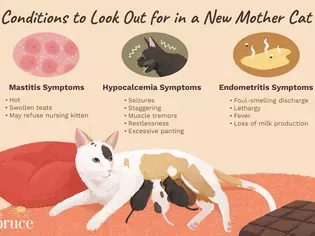Postnatal Care of a Mother Cat and Her Newborn Kittens
Updated on 04/26/24

Postnatal Care of a Mother Cat and Her Newborn Kittens: A Comprehensive Guide
Welcoming a litter of adorable kittens into the world is an extraordinary experience for cat owners. However, this precious time also comes with a significant responsibility to ensure the well-being of both the mother and her newborns. Postnatal care is crucial for the kittens' survival, growth, and development, as well as the mother cat's recovery and replenishment. Embrace the following comprehensive guide to provide optimal postnatal care for your feline family:
Creating a Nurturing Nest
* Provide a quiet and secluded space: Mother cats need a private and safe place to care for their young without distractions or disturbances. Designate a cozy corner in a quiet room, away from busy household areas.
* Create a warm and comfortable bed: Newborn kittens cannot regulate their body temperature, so a warm and comfortable bed is essential. Line the nesting area with soft blankets or towels and provide a heating pad set to low (always monitor the temperature to prevent overheating).
* Ensure access to a litter box: Keep a clean litter box nearby for the mother cat. She will need to eliminate waste frequently after giving birth.
Monitoring the Mother Cat
* Observe her behavior: Monitor the mother cat closely for any signs of distress, such as lethargy, excessive bleeding, or difficulty nursing. Contact your veterinarian immediately if any concerns arise.
* Check for signs of mastitis: Mastitis is an infection of the mammary glands that can occur in nursing cats. Symptoms include redness, swelling, and pain in the affected mammary glands. Seek veterinary attention if suspected.
* Provide nutritious food and water: Ensure the mother cat has access to a high-quality diet and plenty of fresh water. She needs extra calories and hydration to support her milk production and recovery.
Caring for the Kittens
* Stimulate elimination: Newborn kittens cannot eliminate on their own. Gently stimulate elimination by rubbing their genital area with a warm, damp cloth after each feeding.
* Monitor weight gain: Weigh the kittens regularly to ensure they are gaining weight appropriately. If any kitten fails to gain weight or loses weight, consult your veterinarian.
* Keep them clean and warm: Keep the kittens clean by wiping them gently with a warm, damp cloth. Ensure they are warm and snuggled up together in their nest.
* Handle with care: Avoid handling the kittens excessively as they are fragile and easily stressed. Only handle them when necessary, such as for weighing or stimulating elimination.
Feeding the Kittens
* Nursing from the mother: If the mother cat is healthy and producing milk, allow the kittens to nurse naturally. Nursing provides essential nutrients and antibodies for their growth and development.
* Bottle feeding: If the mother cat is unable to nurse or if there are orphaned kittens, bottle feeding is necessary. Use a kitten-specific milk replacer and follow the manufacturer's instructions carefully.
* Feeding frequency: Newborn kittens need to feed every 2-3 hours, around the clock. As they grow, their feeding frequency can be gradually reduced.
Preventing Infections
* Keep the nest clean: Regularly clean and disinfect the nesting area to prevent the buildup of bacteria and parasites.
* Wash your hands: Always wash your hands before and after handling the kittens to prevent the transmission of germs.
* Limit visitors: Avoid exposing the kittens to visitors until they are at least 4 weeks old and fully vaccinated.
* Monitor for signs of infection: Observe the kittens for any signs of infection, such as runny eyes or noses, sneezing, or diarrhea. Contact your veterinarian if any concerns arise.
Weaning the Kittens
* Introduce solid food: Around 4 weeks of age, begin introducing solid food to the kittens. Offer kitten-specific wet food or gruel and gradually transition them to dry food as they grow.
* Supervise feedings: Supervise the kittens during their first attempts at eating solid food to ensure they are eating properly and not choking.
* Gradually reduce nursing: As the kittens become more proficient at eating solid food, gradually reduce the frequency of nursing sessions.
Additional Tips
* Socialization: Allow the kittens to interact with you and other family members in a gentle and positive manner to promote socialization and reduce stress.
* Vaccinations: Follow your veterinarian's recommended vaccination schedule to protect the kittens from common feline diseases.
* Spaying and neutering: Have the mother cat spayed and the kittens neutered when they are old enough to prevent unwanted pregnancies and promote long-term health.
* Enjoy the experience: Raising a litter of kittens is a rewarding experience. Cherish the precious moments and observe their development with wonder and love.
Remember: Every cat and litter of kittens is unique. Always consult with your veterinarian to determine the best approach to postnatal care for your specific situation. By providing optimal care, you can ensure the health, happiness, and well-being of both the mother cat and her adorable newborns.
Explore More Pets

Cat Behavior Problems
How to Stop Aggression in Kittens

Long-Haired Cat Breeds
Siberian Cat: Breed Profile, Characteristics, & Care

Cat Behavior Problems
How to Stop Kittens From Scratching and Biting

Long-Haired Cat Breeds
Turkish Angora: Cat Breed Profile, Characteristics & Care

Basic Training
How to Socialize Your Kitten

Short-Haired Cat Breeds
Cute Pictures & Facts About Calico Cats & Kittens

Litter Box Training
Training Your Kitten to Use the Litter Box

Long-Haired Cat Breeds
10 Fun Facts About White Cats